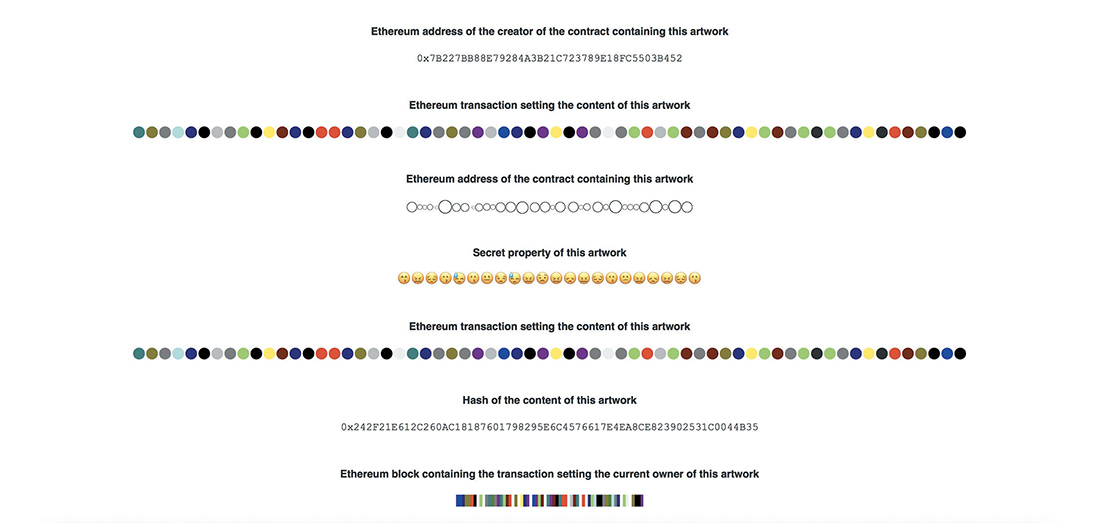Of Crypto and Anarchism: In Conversation With Rhea Myers

Is blockchain a new medium for artistic expression or merely a sales platform for crypto bros? Is crypto a political topic that art needs to address, an opportunity for artists to find an audience and be properly compensated, or is it simply the enemy of art?
Blockchain technology combines decentralized storage of information with digitally-secured transactions, all without having to trust potentially treacherous intermediaries. Among its many applications, blockchain offers the potential to distribute, view, sell, and own art in new ways, but has also been the target of fierce criticism for its environmental impact, its technological opacity, and its links to unregulated financial markets. The continuing booms and busts of the NFT art market, which deals in “smart” contracts that confer ownership of digital art assets, have only served to make the debate ever more fierce.

Rhea Myers was one of the first contemporary artists to enter into creative, conceptual, and speculative engagement with this “new internet,” having embarked on her first art projects focusing on blockchain technology in 2011 — only to find the world in uproar about NFTs, and her work on sale at Sotheby’s, a decade later! A professional programmer who has worked at each level of the blockchain, Rhea originally trained as an artist, and draws on the histories of conceptual art and net art to produce works which critically explore the ways in which blockchain disrupts assumptions about property, value, authenticity, art, and the artist. The text that follows is excerpted from a much longer, wide-ranging discussion featured in “Proof of Work: Blockchain Provocations 2011-2021,” an anthology of Myers’s pioneering blockchain art, along with a selection of her essays, reviews, and fictions.
Maya B. Kronic: Your work is obviously about more than technology. It’s full of formulations like “Blockchain Aesthetics” and “Blockchain Poetics,” and I was struck by your description of Bitcoin as a “development in cyberculture” rather than just a technology. Many of your works exhibit a sensitivity to the charm and energy of the cultural scenes that assemble around technological platforms and indeed play a part in their growth. Dogecoin, Ethereum, Rare Pepes, these are all instances of the collective charisma that can burgeon around an online project, even something as apparently nakedly financial as a cryptocurrency. In an article that you cite in “Blockchain Poetics,” Brett Scott argues that a rational account of the emergence of money is always inadequate because, in order for exchangeable objects to accrue social value, they have to already be imbued with some kind of cultural energy, something akin to artistic value.
Rhea Myers: Prior to Bitcoin I was looking at bronies, and before that at more general internet culture — I just immerse myself in these things. I describe culture as Dogecoin’s secret sauce, because it didn’t have a particularly better algorithm than Bitcoin, although it is slightly faster. The thing that was different was its community’s Bill-and-Ted-esque spirit of excellence and charity and support and welcoming and inclusion. Something which I assume was calculated to begin with, but as far as you could tell, was pure and in earnest. Even today, if you dropped the Bitcoin and Ethereum and Doge communities in a barren wasteland somewhere and came back in two years time, I know which one I would put my money on still having any kind of functioning social fabric. That in part is what “Bad Shibe” [Rhea’s 2017 novella] is about. Unfortunately the social is all but invisible to the crypto bros who believe that conventions just appear and communities just spring up. That willful ignorance of the social labor of reproducing crypto culture is just fascinating, not to mention that it’s transparently and ridiculously gendered too. So looking at those more social aspects does give you a critical way into the culture. And gaps in the culture give you clawholds on the sloping glass roof of the nice happy libertarian-to-VC pipeline of crypto technology.
MBK: The word “currency” understood not just in terms of money but also as involving a cultural current, a nowness which has a social and emotional dimension.
RM: Yes, which allows the bootstrapping of a socially valued currency — and makes FOMO, the fear of missing out (e.g. on a token drop), the original source of value! If we take Marx’s view of the evolution of money — treated very trollishly in “Why Bitcoin is Money According to Marx” — there’s no mysterious meteor that hits the earth and imbues everything with value, there’s a base layer of things, people want one thing more than any other for some irrational reason, and it becomes a medium of exchange precisely because of this charm. This then spins up into financial hyperspace and turns into money.
MBK: As Scott points out, Bitcoin, for example, is imbued with the mystique of Satoshi Nakamoto.
RM: And he’s absolutely right there. Technology is of course socially embedded and produced, and technology has a cultural history and is a part of the history of ideas. The mythology of Satoshi is incredible, they’re the absent founder who has, not ascended to heaven, but returned to perfect cypherpunk secrecy, and that’s so generative for Bitcoin. Just as the figure of the doge for Dogecoin means that you have this sort of non-human benevolent avatar, and for Ethereum Vitalik Buterin is this monklike figure who does his best not to get drawn into squabbles whether they come from outside or within the Ethereum project. So those sort of founding myths or prophet figures are there.
The dream of the cypherpunks is that you can somehow match technologies to your political objectives.
But the choice of technology also shapes the kind of culture you’re engaged with. Like the representation schemes used for different cryptocurrency addresses — Bitcoin addresses are easy to recognize and contain a checksum to ensure you type them correctly, Ethereum uses a format that is very easy to get wrong. That generates different social conversations. There is a culture to coding, to the choice of technology, to the mixing and prioritizing and valuing of different technological elements. I may be overdoing it, this may be only one percent and the culture around it is the other ninety-nine, but the dream of the cypherpunks is that you can somehow match technologies to your political objectives. And in the case of Bitcoin, that succeeded beyond anyone’s wildest dreams.
MBK: That suggests that there may be a politics embedded in the technology, and yet you seem to appeal to your readers to pare Bitcoin, and blockchain technology more generally, away from the various political ideologies that have appropriated it, or with which it’s associated by its denigrators. Is ideology baked into Bitcoin as a project, or not?
RM: Bitcoin is a practical solution to an open problem in the cypherpunk political project. The cypherpunks wanted private communication, and they got it, and that’s amazing — that’s what the Crypto Wars were fought for, and we’re all very grateful to them for that, it was a positive outcome for society. But beyond that, what they wanted was state-free everything, because they have a strong anarcho-capitalist bent. They wanted state-free money, and there were various sketches for that which almost worked, but if they involved the technical necessity for a central authority, then that can be compromised and the state or some other party can interfere in the social exchange of value at the moment of transaction. The thing that Bitcoin does is to make it impossible to interfere at the moment of transaction. This is a very modest achievement. There are many other things that you need to do in order to have a free society, however conceived. But within the cypherpunk political project, Bitcoin is a genuine solution to a problem in how they wish to justly organize social relations.
So to the people who get so mad about Bitcoin as a product of ideology: You’re absolutely right, it’s the product of cypherpunk ideology, it is antistatist, and it does not take a stance against the commodity form of either property or money. That’s something I talk about in great detail in “Blockchain Poetics” because, as far as I can tell, the difference between anarcho-capitalists and anarcho-socialists comes down to whether they believe it is possible or desirable to abolish the commodity form.
But when it comes to Bitcoin, the Left in general has been very upset that, with this exclusion of a potential moment for injustice at the moment of the transaction, there’s also an exclusion of a potential moment for redistributive justice. No redistribution of wealth can happen here. But whether you’re a left- or right-wing anarchist, you want the state out of people’s social relations. And after the abolition of the bourgeois/neoliberal/etc. state there won’t be a state to redistribute anything anymore anyway, so why are you getting so upset about this? In “Blockchain Poetics” I go into a lot of detail mapping from anarcho-capitalism and the cypherpunk program to the specific design choices that Bitcoin makes, to try and inform imagined socialist interventions in the technology. There is a history of projects that take cryptocurrency and say, Okay, we’re gonna change this and make it work in a more benevolent way, and in doing so change the very finely tuned engineering constraints on Bitcoin and end up with something that is exploitative, unstable, or gameable in ways they simply wouldn’t want. Unfortunately there’s a belief that your good heart will get you there and you won’t need to get your hands dirty with the engineering. But however problematic the figure of the engineer is for socialist theory, and however little you may like these ideological underpinnings, you have to make an attempt to understand them.
I’m not exactly shocked when people who think all technology is fascism decide that Bitcoin is fascism. But it’s not, it is a genuinely anarchist technology, it is an anti-statist technology. I can fully understand how uncomfortable it is for the reformist “the best we can hope for is trivial modifications to the state until we all die baking in the Anthropocene sun” tendency to encounter something that actually operationalizes a political program, but this technology precisely excludes the possibility of an actual fascist state intruding into your ability to carry out exchanges. Take a look at the United States today, where Bitcoin might come in extremely useful if you want to pay for an abortion, pay for hormones, pay to flee the country. These are all things we’ve been told no one would ever need to use money to do, or need to do without the state watching. Lo and behold, it’s 2022 and people are almost beginning to put together the idea that a state panopticon of money and a government that is not your friend may not be the best combination.
People are almost beginning to put together the idea that a state panopticon of money and a government that is not your friend may not be the best combination.
None of this means that you can or have to ignore the large pools of capital involved, which are very easy to examine — precisely because current public blockchains are transparent. Actually taking the time to find out how to perform that kind of examination is another part of the demand that I make for competence in critical engagement with this technology. With Bitcoin you are beholden to those who came before you because they mined Bitcoin back when it was possible to do so with a modest amount of computing power. Or, in the case of Ethereum and other later currencies, they were smart enough and/or privileged and/or well-informed enough to get in on the pre-sale. So there is a tendency for there to be a hierarchy of early versus late adopters, something which is obviously not friendly to left anarchism. It’s very friendly to right anarchism because right anarchism, anarcho-capitalism, views the state as an impediment to your personal power and particularly to the power of your money. In contrast to this, left anarchists view the state as an impediment to a more equal society. These are very different views on what removing the state will achieve for society.
So Bitcoin has that first-mover advantage, not quite by accident but certainly with less of a program than the later cryptocurrencies — those that followed it do really bake in first-mover advantage in a way that I’m tempted to say wouldn’t be such a problem for the Left if they had been mining from day one.
MBK: That brings us to your relation to left-wing politics, which is obviously not without its complexities. In many of these texts you seem to be espousing an extreme accelerationism — removing all the brakes, whether social, technological, or psychological, on the tendencies unleashed by blockchain technology. Your writing deliberately makes it difficult to evaluate the level of irony at play, something that has been a constant source of amusingly heated Twitter exchanges.
RM: I’ve had a lifelong feeling of being an outsider. I’ve certainly been socio-economically privileged: I’m from the end of the post-war settlement, the state paid for my education, I’m white-passing, I know people who had to work far harder than me to be part of the technology industry in England, and some of those people gave me a chance in that industry as a newly graduated art student. But that didn’t give me any secure or lasting sense of belonging or security. And so, to a degree, since I was chronically unsuccessful at “finding my people,” my work tended to be addressed to whatever group of people I was annoyed with at the time. Usually a group that I was or am a part of. For example, I describe “Bad Shibe” as my exasperated love letter to the Vancouver crypto scene.
One of the techniques I often use came originally from a conversation on an old mailing list with one of the writers of the “Twilight 2000” role-playing game. One thing I liked about the imagined future historical scenario of that game was that it disappoints everyone’s expectations for a Third World War equally. If you’re a hawk, the military effort just grinds down to a degrading and shameful standstill; if you’re a political wonk, the American government breaks down to the point where there are running gun battles in Congress; if you’re someone who’s anti-nuclear, well, there’s a nuclear conflict with horrific effects but civilization is crawling on and things are really only about as bad as they were in the mid-twentieth century, and so on. Nobody gets to say Aha, I told you so! This is bathos, the deflation of grand claims.

This movement of bathos — which is something I also find in the work of the artist collective Art & Language — is present in everything I do in these projects, where however grand the claim made at the start, there’s a moment where you have to say, Okay, but is that it? There’s got to be more to this…and there is always more to it, but you have to be able to make the jump to those coordinates, to be able to say, for “Secret Artwork” (2018) for instance, Possibly the world’s most ridiculously secure unknowable secret isn’t just there for me to go wow, they put a hash on the blockchain. Or for “Tokens Equals Text” (2019), Maybe there’s more going on in this little vaporwave typography display than meets the eye….

However ironic the work, I am reflexively left-wing. I trust the Left to at least kill me more slowly than the Right. I feel no joy (and didn’t from a very early age) in anything restrictively traditional or in any kind of reproductive ideal that you have to live up to. And I’m certainly a very boring atheist. But I really felt the critique of Nick Srnicek and Alex Williams’s “Manifesto for Accelerationist Politics.” I know that you can make a very good career from beating up on identity politics, and as someone who “has an identity,” I would like to be very clear that I do not wish to do that. But at the same time, the genteel libidinal security of merely symbolic resistance is essentially a ritual blessing for whatever it is supposedly against. The insufficiency of the institutionalized Left and of always-already-defeated mediatized leftist politics, which the Manifesto really nails, is something that’s always deeply irritated me.
So what you see here is my exasperation and heartbreak and my aching wish for a better world — which I don’t have the economic or psychological or rhetorical or discursive security to put into mere dreamwork. I am unable to say I’m starting this artist’s cooperative, we’re gonna pay artists a living wage and everything will be great without also thinking Okay, where does the money come from for this?
MBK: Asking questions about money is particularly unwelcome in the contemporary art community, which is simultaneously deeply complicit with capital, and requires everyone present to affirm it as a singular site of criticality and resistance against capitalism. What does it mean to introduce into that world artworks made in a medium that is transparently (in every sense) a monetary instrument?
RM: Remember that old Ad Reinhardt cartoon of a gentleman in a trilby pointing at an abstract painting and saying What does this represent?, and the painting pointing back at him very angrily and saying What do you represent? In the context of the contemporary art world I would modify it to say Who pays for this? And then the painting (or the NFT) points back and says Who pays for you? It’s a milieu where you’re always working for some blob of capital that has come from taxing miners or selling slaves or taking the tops off of mountains and digging rubies out of them or whatever, but there is generally a comfortable ignorance of how the sausage is made, and you get to sit there and say to people that money is this horrible dirty thing. This has happened to me on a number of occasions: I can see that you are getting your money from a venture-capital-funded corporation, that’s terrible. I have this unproblematic position from which I can say that you should do this other thing that I have in mind. And that other thing turns out to be some sort of pantomime of value which only works if you have secure income and healthcare, which of course you have if you work for a big nonprofit or state institution. The fact that the money paying for it is the heat noise of historical capitalist exploitation seems to be far less problematic in that context because you can’t see it clearly, whereas Bitcoin is pure messenger, in the sense that it gets shot every time because you can see the money. My response to that isn’t to point out how terrible what we are seeing is, it’s to point out that being aware of it in this way is a useful thing. Here we have a transparent and plastic medium for looking at the exchange of value, where it comes from and where it goes to.
However ironic the work, I am reflexively left-wing. I trust the Left to at least kill me more slowly than the Right.
This lack of plausible deniability, the fact that not only do you know how the sausage is made, but you’ve got a sausage machine here whirring away on your own desktop — it changes things. Of course I know that there is no ethical production under capitalism. But why is this the production we’re objecting to so vocally? I appreciate that part of it is because people feel that crypto genuinely has no value, that it genuinely has no social utility that could not be achieved by more just and less socially and economically and ecologically harmful means. But as I often say to people, and as they often get very annoyed at me for saying, if it could be achieved in another way it would already have been, and if it had been, then the same people who you don’t like buying up blockchain projects would be buying up projects on that because, you know, we’re like little financial amoeba around these financial gravity wells.
Blockchain technology is a tiny crack, a tiny shifting of the ass cheeks of capital, it’s a moment of potential for a temporary autonomous zone. And I’ve been amazed by how long that moment has lasted. I’m not here preventing revolution, I’m here trying to get a minor redistribution of wealth within this moment where capital has not yet slammed shut the door on any alternative or any support for anything other than adopting a hyperextractivist attitude in every single social relation. And frankly, I regard that as more useful than most of what the people who get terribly upset with me for doing that are trying to do.
Rhea Myers is an artist, hacker, and writer originally from the UK now based in Vancouver BC in Canada. Her work places technology and culture in mutual interrogation to produce new ways of seeing the world as it unfolds around us.
Maya B. Kronic is the agent, patient, and product of an ongoing research project on hyperstition, gender accelerationism, and cuteness. They are currently co-director of research and development at Urbanomic.



